A chat with Kyle Pawlaczyk
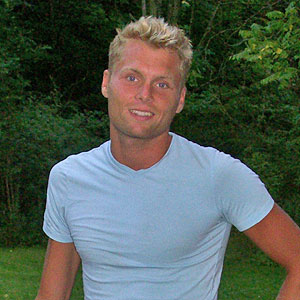
Kyle Pawlaczyk is a pro triathlete who just wrapped up his freshman season. Based out of Richmond, VA he secured two top tens in the 70.3 series and was 13th at Ironman Lake Placid. Kyle will be racing for USPro Tri and 2011. He recently chatted with Sal Farruggia about trying to make it big in the sport of triathlon.
Slowtwitch: Kyle, why don’t you begin by telling us some things about the glamorous life of a 1st year pro.
Kyle: Well, I recently graduated from sleeping on an air mattress to sleeping on an actual bed and mattress because of a really good deal on Craigslist. The mattress is comfortable and smelled OK before I started sleeping on it. So yeah, life is pretty simple. Frankly, it’s probably not how you’d expect a 27-year old with a Master’s degree to be living, but I can tell you with a straight face that I wouldn’t trade it for anything.
ST: What were some of your highlights of 2010?
Kyle: The highlight was being able to race the very best, which is what I’d been looking forward to since really starting triathlon in 2009. I had two top-10 finishes on the 70.3 series, both of which came in front of a strong contingent of family. Having some promising finishes, coupled with the support of friends and family (who either came out to races or parked in front of the athlete tracker on their Sunday mornings), made 2010 a rewarding season.
ST: And conversely what were some of your tougher 2010 learning experiences?
Kyle: I suppose the biggest lesson was that becoming a top-tier pro will not happen overnight. I never had that big breakthrough race that every athlete hopes for, and looking back, that doesn’t bother me. I work as hard as anyone and believe that I have an exceptional amount of talent as a triathlete, but I’m still young, both chronologically and in terms of triathlon experience. I look at guys like James Cunnama and Ben Hoffman, both of whom had breakthrough years in 2010 and beat the heck out of me. They don’t have anything that I don’t. If you asked them, they’d probably tell you that they’ve just worked hard, stuck with it for the past several years, and the results have come. So, the big learning experience was that success will take patience and hard work over a relatively long period of time.
ST: For the time being, how do you sustain yourself financially?
Kyle: I work part-time at Endorphin Fitness in Richmond, Virginia. EF is basically a one-stop shop for triathletes. We offer group and individual coaching, performance testing, bike fitting, and we recently opened a retail store. I serve primarily as a cycling and running coach at our group practices. The best part about the job is working with our athletes who are, in a word, awesome. I also coach some outstanding younger athletes; we have one of the most active youth triathlon programs in the country. I spend some time in our retail store, too. It’s a great job and it still gives me the time I need to train. If you asked me to come up with a “dream job” to complement my pursuit of a triathlon career, this would be it.
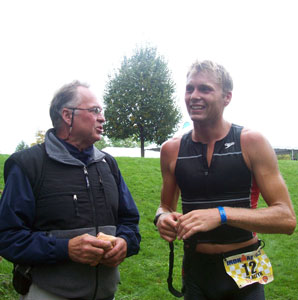
ST: How do you get connected with your sponsors?
Kyle: As a pro with modest results and only a year or so of racing experience, good sponsorships can be difficult to come by. I try to sell myself as a promising athlete who is articulate, approachable, and can write in complete sentences on his blog. I try to seek out sponsors whose image and products appeal to me. On that note, I will be joining USPro Tri in 2011. We are supported by Geico, Jamis, Hed, Profile Design, Newton, Sigvaris, Kinetic, 1st Endurance, Nathan, and Champion System. US Pro team manager, Ryan Bates, was one of the first people I contacted when I turned pro. The team seemed to be a collection of “blue collar pros,” which really appealed to me. When the opportunity came to join this year, I did not hesitate. The team will consist of 10-12 pros this year, and we try to maintain a strong presence in big races throughout the Northeast and the Midwest.
You see the team concept becoming very popular in triathlon. This is great for an athlete like me, because it gives me a bit of an identity and associates me with a group of solid, hard-working pros. The team concept also seems to offer sponsors more bang for their buck. In terms of creating brand awareness, sponsoring a single pro is generally not a great investment for sponsors. When you sponsor a group of pros who are racing and putting up good results almost every weekend, you’re going to generate much more exposure. It’s a win-win.
ST: Without getting into it too much, what are the terms of sponsorship usually like?
Kyle: The sport is very top-heavy in terms of sponsorship dollars and perks, which I understood going in. For an athlete like me, simply having all my gear needs taken care of represents a tremendous boon. To live well as a triathlete, you generally have to be one of the best. I’m confident that I can get there, but between now and then, athletes like me get caught in a bit of a Catch-22 trying to make that leap to full-time pro; you have to be one of the best to truly support yourself as an athlete, but getting to that level requires a lot of support in the first place.
ST: Are you still looking to add sponsors?
Kyle: Sure! And please spell my name right on the check: P-A-W-L-A-C-Z-Y-K. Don’t be afraid to mail cash, either.
Financial support is hard to come by for most triathletes. If my racing kit were truly reflective of where my support comes from, it would say “Mom and Dad” on it in big letters. We’re not rich by any means, but they’ve provided me with financial support I needed to get this far. The support goes beyond money, too. As I wrapped up grad school, I started leaning towards really going for it with my triathlon career instead of “growing up” and getting a real job. My parents supported me without reservation or hesitation. Perhaps most importantly, Mom and Dad provided me with good genes and raised me to believe that I can accomplish absolutely anything.
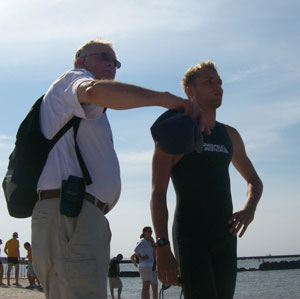
ST: You’ve mentioned you’re a self-coached athlete. What’s that like?
Kyle: Some people might liken me to the proverbial “lawyer who represents himself,” but it works for me. I spend a lot of time on the Slowtwitch forums, so I obviously know everything there is to know about triathlon training. Because of my education and athletic background, I have a pretty good understanding of how to structure training. I can usually reflect thoughtfully and honestly on what I’m doing in training and racing, too. This is difficult for some athletes. There will probably come a time when I’ll want a second pair of eyes looking at my training, but until then, I seem to be doing fine.
ST: Looking ahead to 2011, how do you plan which events you’ll race? What makes a race attractive for a new pro?
Kyle: With about 6 weeks of “real” training done, I’m getting a pretty good idea of where my fitness is. This gives me a pretty good idea of when I’ll be really ready to race. I’ll look for a big race and work backward from there. Specifically, I’m looking at returning to Lake Placid this year and racing well. Right now, I’m leaning toward opening things up with a good race at the 70.3 distance in Oceanside and/or New Orleans. As you can imagine, my “travel budget” limits where and how much I can race, so if a race is accessible and provides me with an opportunity to make a splash, I’ll have an eye on it. Being based out of Richmond is nice; I am within driving distance of many big races on the East Coast.
ST: Will you be sticking to distances of 70.3 and more in 2011?
Kyle: Yeah. I’ll be focusing on the longer stuff, but my swimming is continuing to progress and I think I can reclaim my “get-down speed” from my running days, so you might see me in some shorter stuff. Ultimately, I think my talent lies with long-distance racing, though.
ST: In May you finished a Masters degree in physical education, is that the fall back plan if triathlon doesn’t work out?
Kyle: I really love teaching, and I’m fortunate to get to put some of my teaching skills to work at Endorphin Fitness. It’s probably something I’ll come back to eventually.
ST: So how’d earn your pro card?
Kyle: I earned it at the 70.3 event in Augusta in 2009. My goal heading into the race was to become eligible for a pro card. I remember finding a hotel lobby with my dad (who spent about 30 hours in the car that weekend to see me race) and checking out the results. It was pretty cool, sitting there with my dad, who had made it all possible, and realizing that I’d done it. Of course, I had to be back in Charlottesville the next morning to student teach. About 30 seconds into my first class, one of my second graders said: “you look tired!” I was like: “Sweetie, you have no idea.”
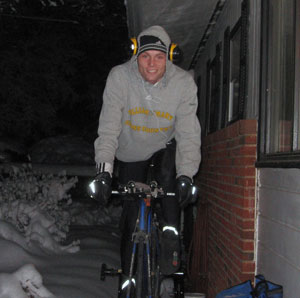
ST: How are the pros treated at the events you’ve competed in?
Kyle: We don’t have to wait in line for our race packets at Ironman races. Judging by how quickly that line moves, that saves me about two and a half days on race weekend.
Personally, I don’t care how I’m treated. What I think is more important is how the pro race itself is treated. Triathlon will grow at the pro level when our races are given a “big time” feel. Vigo and his gang at Eagleman did a very nice job of that last year. They had live video, a helicopter, and made a sincere effort to really showcase the pro race. Rev3 seems to do a nice job with this as well, and I’d like to support them this year.
The growth of Ironman, Rev3, the 5150 series, the Lifetime Series, the Challenge Family, and the TriStar events is encouraging. For the first time in quite some time, we have races competing for the attention of pro athletes. Hopefully, this is a sign that the value of the pro field is growing in the eyes of race directors.
ST: IM Lake Placid was your first 112mile ride and first marathon as well, how did that play out?
Kyle: It wasn’t bad. One of the things I do really well is eat, which has proven to be a valuable skill for Ironman racing. I wasn’t too worried about the marathon. I figured those 20-mile long runs at 6-minute pace with a hangover during my college days had prepared me for what I would feel on the run leg, but that wasn’t quite the case. It wasn’t exactly the performance I wanted, but it left me feeling like I can race well at Ironman.
ST: During the race did it feel like you were racing against your competitors or just doing a real long workout?
Kyle: I treat training and racing as completely different animals, so I felt like I was racing when I was out there, but coming from a running background, triathlon racing has been a bit of an adjustment. If a group puts 100 meters on you during a 10k on the track, they’re usually gone for good. Contrast that with triathlon, where a guy can be 10 minutes up the road and still be on your radar. It’s quite a bit different; triathlon requires patience and focus, and a lot more goes into your racing decisions.
One of the things I really enjoy about pro racing is that it represents a true racing experience. You start first and generally don’t overlap with age group waves, so you have a good idea of where you stand. In age group racing, the guys I was competing against weren’t even necessarily in the same wave as me.
ST: And for the readers, your future fans, race directors and announcers, how do you pronounce your last name?
Kyle: Pauv-LA-chik. It is Polish.
You can follow Kyle’s budding triathlon career at; http://kptri.wordpress.com/


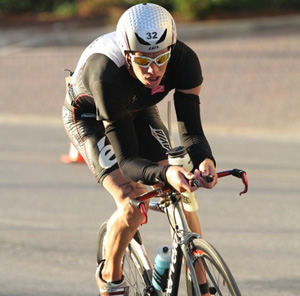
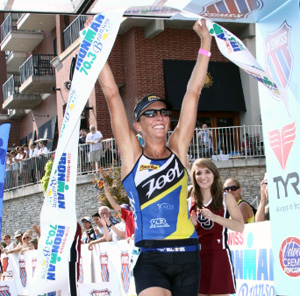
Start the discussion at slowtwitch.northend.network